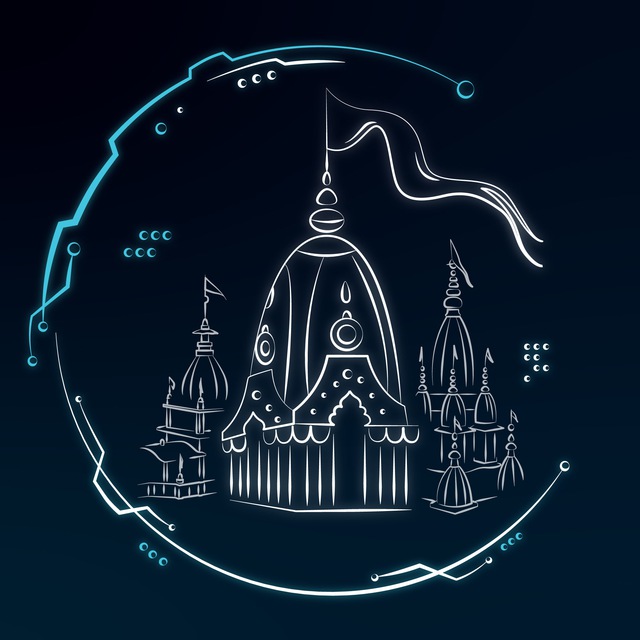«Вайшнавизм и индуизм»
Vaishnavism and Hinduism
Journal ‘The Harmonist’
Edited by
Shrila Bhaktisiddhanta Saraswati Thakur
(No. 3, Vol. XXV, August 1927)
WHEN Shriman Mahaprabhu on His return from Gaya initiated congregational preaching of the shuddha-sanatana-dharma (the pure, eternal religion) the people of Navadwipa were filled with panic. In a well-known passage of his famous work, Shree Chaitanya-charitamrita, Kaviraj Goswami has graphically described the then attitude of a section of the Hindus. Some of the Hindus even went so far as to prefer formal charges against the conduct of Mahaprabhu before the Kazi, the local agent of the Moslem government, praying for His outlawry in the interest of religion. The charges brought against Mahaprabhu are given in the passage of Shree Chaitanya-charitamrita referred to above. These Hindus said in effect — «The kirtan propounded by Mahaprabhu was a thing they had never heard of. The kirtan of Mahaprabhu was objectionable because it was sung loudly to the accompaniment of mridanga and karatal, constantly and by many people together. It prevented their sleep. It was against Hinduism as it admitted the lowest class to the privilege of chanting the Name of Krishna. It was profane as the Name of Krishna was admitted even by Nimai to be maha-mantra and as such must not be noised about, as according to the shastras of the Hindus the potency of a mantra is impaired if it be heard by any person». They urged with commendable caution that the keeping up of nights by Hindus at the worship Mangalchandi and Vishahari at which dancing, singing and music were very properly performed could not constitute a precedent in favour of the new-fangled practices.
The smartas (the followers of smriti, canonicals) made these allegations against ‘Avatar’ Shree Gaur-Sundar, ‘the Saviour of Kali-yuga’ (source of incarnations), ‘the only maintainer of the yuga-dharma’ (the divine dispensation of the Age) as Nimai was guilty of endeavoring to introduce the un-alloyed devotion to God denoted by kirtan which is the only eternal dharma (function) of all jivas (beings) in place of the dharma, concocted by the human mind, that accorded with their ideas. These protesting Hindus were under the impression that the puerile creed which they had acquired by right of inheritance was ‘Hinduism’. The dancing, singing and musical performances with which the vigils of Mangalachandi and Vishahari were kept perfectly innocent because by their means the desire of sensual gratification and aversion to Hari increased. Those orgies did not disturb them in the least but their ears were deafened by the sound of mridanga and cymbals. They were particularly lavish in their praise of the previous conduct of the very Nimai which they declared was perfectly blameless because it bore an external resemblance to their own at least to an extent. But after his return from Gaya when He began to preach openly the dharma of the soul His practices at once appeared to them to be ‘destructive’ of all religion.
This religion which they chose to call ‘Hinduism’ consisted, in their opinion, in the worship of Mangalchandi and Vishahari; in ‘the thirteen festival, of the twelve months’; in shraddhas (funeral ceremonies) for appeasing the ghosts of dead ancestors; in the performance of domestic duties after the approved manner of un-complaining beasts of burden — marrying and giving in marriage, loyally practicing the duties of eating; sleeping, fearing, sexuality etc. till the very moment of the exit from this world; for fear of the next world by means of ‘gifts’, ‘contemplation’ etc. procuring the reputation for holiness and other honours from Godless people of this world and also gaining thereby Heaven and other enjoyable lokas (regions). It was ‘Hinduism’ in order to earn a living and become known as a religiaus, effecting a compromise between the verbal name — a mere thing of this world which is itself the manifestation of the external, shadowy Power of God, and the eternally self-revealing Holy Name of the Godhead; to take as occasion serves this grossly — distorted, reflected image of the Name; or to suppose that the Name is on a level with dharma, jajna (sacrifice), brata (vowed observance) etc. and, therefore, with all greater confidence to nourish every manner of evil thought on the basis of such perverse reliance on the Name; etc. etc.
And because this ‘mere’ ‘Lad’ was proclaiming truths that were opposed to such concoctions of the diseased mind therefore, they thought that they owed it to themselves to drive Him out as the ‘destroyer’ of the religion of the Hindus. Nay, further, as the maha-mantra of the Name of Krishna was on a par with other mantras and as no mantra was to be uttered in a loud voice so as to be heard by anybody else, the potency of mantra being impaired if heard by any man, and as Nimai Himself said that the Name of Krishna is maha-mantra and yet loudly proclaimed the same purposely to make all people hear the Name, therefore, was it not decisively established that by such conduct which was undeniably opposed to the shastras He was proved to the guilty of deliberately profaning the shastras of the Hindus?
These so-called Hindus who were as a matter of fact polytheists who placed the chit and jada (the conscious principle and matter) in one and the same category, who considered Ishvara (transcendental Ruler) and the Name of Ishvara as a mere constituent part of their ordinary ceremonies, in order to harass Shree Gaursundar had recourse to the Kazi and having approached him had the effrontery to say — «This Nimai is obstructing the preaching of the Muscleman religion, therefore, as you have the power it is your bounden duty to turn Him out of the town».
Vaishnavism was in this manner maligned by a section of the Hindus in the days of Mahaprabhu. The prevalent opinion of the present day happens to be that Vaishnavism is only a branch of ‘Hinduism’. But those who have had the good fortune of realizing the true nature of Vaishnavism know that the Vaishnava can by no means be styled as a common ‘Hindu’. The Vaishnava is never a brahman, kshatriya, vaishya or shudra. The Vaishnava is not a common Hindu or a karmi. It is no doubt true that a Hindu who is born in a brahman, kshatriya, vaishya, shudra or antyaja family or any other person whoever he may be is potentially fit to be a Vaishnava. As a matter of fact any jiva (being) whose spiritual nature has been awakened is fit to be a Vaishnava. But if, therefore, a Vaishnava is designated as a Hindu, Muscleman, Christian, brahman, kshatriya, vaishya, shudra or antyaja the thing signified by the term is not exactly indicated. Those who suppose that a Vaishnava is a Hindu, brahman, kshatriya, vaishya, shudra or antyaja are utterly ignorant of the real nature of a Vaishnava and of Vaishnavism.
The so-called Vaishnavas of the present day are so misinformed of their personality that when they are asked about their designation they think it to be honourable to describe themselves as Hindu, brahman, kshatriya, vaishya, shudra etc. Such designations are not applicable to a true Vaishnava. A Vaishnava ever describes himself only in term of his own proper and eternal nature as an humble aspirant for the service of the servant of the servant’s servant of the Supreme Lord. Because such designation truly describes the nature of the Vaishnava. Shreeman Mahaprabhu has taught us this Truth in the Sanatan-shiksha (His teachings to Sanatan) that the jivas proper self is the eternal servant of Krishna.
Those whose minds are much too thickly incrusted with an accumulation of empiristic ideas may make a pretence of supposing the above ‘to be a piece of sheer bigotry on the part of Mahaprabhu’. But if such self-deluded people ever have the good fortune of being truly enlightened by the Grace of God they will only then understand that all beings are the fractional parts of the One Absolute Truth and the eternal servants of the Source of all avatars (incarnations), Ishvara (Divine Lord), the One, the Son of the Lord of Braja — Shree Krishna.
Because we have lost all memory of our true selves, therefore, it happens that we are so over-anxious to be designated ‘Turks’, ‘Hindus’, or ‘shrautas’ and to suppose that the highest duty, the summum bonum, of life consists in the preservation of the ‘Hindu dharma’ or in other words ‘the function of the body and the mind’. Here in Bengal we recognize Harihar Baudopadhya’s son Raghunandan Bhattacharyya as the great man when all of us should follow. Raghunandan has made an elaborate arrangement for the perpetuation of this ‘Hinduism’ which ensures the endless cycle of births and rebirths in the company of a motley host of changing dogmas; and consciously or unconsciously enlisting ourselves as the loyal disciples of the Bhattacharyya mahashaya we are often in danger of committing the grave offence of hating those sincere Vaishnavas who practice exclusively the dharma of the soul supposing them to be transgressors against the ‘good’, ‘old’ customs and as being devoid of the religion of the ‘Hindus’. Hence even Advaitacharyya although appearing in a staunch Hindu family is in our opinion a back-slider from the path of Hinduism, because he had the temerity to receive with honour the devotees of God. Similarly Nityananda, also coming of a Hindu brahman family, is according to our judgment guilty of unholy practices as he taught the world by His personal practice to honour the maha-prasad. And some of us do not hesitate to go still further and even to insinuate that Mahaprabhu Himself upheld those ‘good’ customs of the ‘Hindus’ against Nityananda and Advaitacharyya! Mahaprabhu always said that no one was fit to be a teacher of dharma who himself did not practise it. He Himself set the example by practicing personally the shuddha-sanatana-dharma (the unalloyed eternal function) that He taught. This is what He Himself has said of His Own practice —
naham vipro na cha nara-patir napi vaishyo na shudro
naham varni na cha griha-patir no vanastho yatir va
kintu prodyan-nikhila-paramananda-purnamritabdher
gopi-bhartuh pada-kamalayor dasa-dasanudasah
«I am not a brahman, nor a kshatriya, nor a vaishya, nor again a shudra; neither am I a brahmachari, a grihastha, a banaprastha nor a yati. But I am only the servant of the servant’s servant of the lotus Feet of the Consort of the damsels of Braja, Who is the ocean of nectar overflowing with eternally self-revealed, fullest, transcendental bliss».
The author is unknown








































































































































